DOCETAXEL - INJECTION
PHONETIC PRONUNCIATION: (doh-seh-TAX-ell)
COMMON BRAND NAME(S): Taxotere
GENERIC NAME(S): docetaxel
Uses
USES: This medication is used to treat cancer (such as breast, lung, prostate, stomach, and head/neck cancer). Docetaxel is a member of a family of drugs called taxanes. This drug works by slowing cell growth.
How to use DOCETAXEL - INJECTION
HOW TO USE: Read the Patient Information Leaflet available from your pharmacist. Consult your doctor, nurse or pharmacist if you have any questions. This medication is given by injection into a vein by a health care professional, generally over 1 hour every 3 weeks or as directed by your doctor. The dosage and frequency is based on your medical condition and response to therapy. Your doctor may prescribe pre-medications (e.g., corticosteroids such as dexamethasone) to prevent side effects like swelling (fluid retention/edema) and allergic reactions. These are generally started 1 day before treatment and continued for a total of 3 days. Carefully follow your doctor's orders to prepare for your treatment. If you forget to take your pre-medication, or do not take it on schedule, tell your doctor or nurse before you receive your docetaxel treatment.
Side Effects
Precautions
Interactions
Overdose
Images
Reviews
Warning
WARNING: Docetaxel has caused severe (rarely fatal) allergic reactions and swelling (fluid retention/edema) even with the use of preventive medications. This drug must not be used in patients who have previously had an allergic reaction to it or to other medications containing polysorbate 80. There is an increased risk of serious (possibly fatal) reactions in patients using docetaxel who have liver problems, patients receiving higher doses, and patients with non-small cell lung cancer who have received certain other chemotherapy drugs known as "platinums." If you have a low white blood cell count or liver problems, notify your doctor before using docetaxel. Seek immediate medical attention if you experience swelling, dizziness or fainting, difficulty breathing, irregular heartbeat, severe swelling of the abdomen, skin rash, easy bleeding or bruising, sores in the mouth or throat, or symptoms of infection such as fever and sore throat. Your doctor will closely monitor you and your blood counts and liver tests while you are receiving docetaxel.
Disclaimer
IMPORTANT: HOW TO USE THIS INFORMATION: This is a summary and does NOT have all possible information about this product. This information does not assure that this product is safe, effective, or appropriate for you. This information is not individual medical advice and does not substitute for the advice of your health care professional. Always ask your health care professional for complete information about this product and your specific health needs.
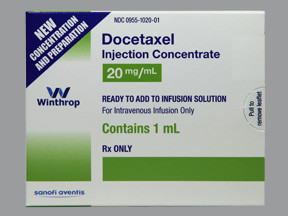
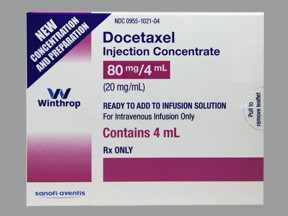
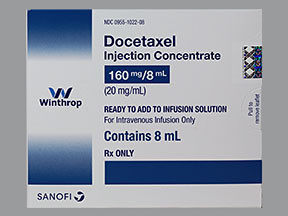

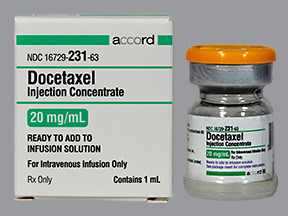
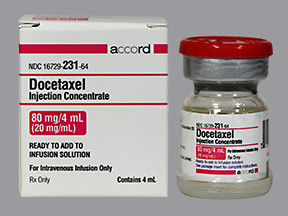
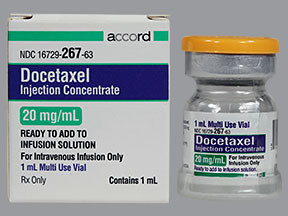
No Reviews Yet